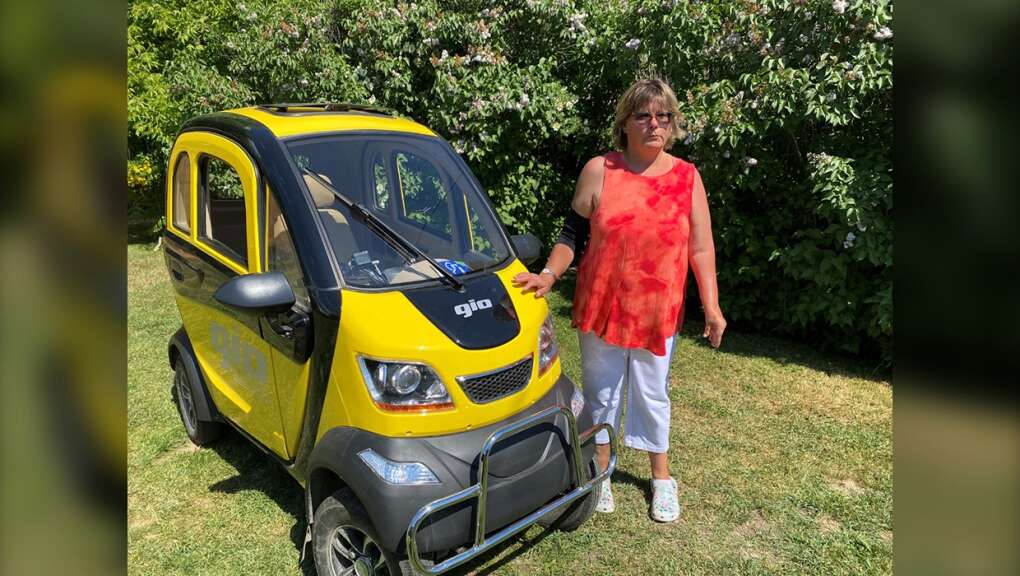An Olds, Alta., woman with accessibility issues is speaking out against the town after local bylaw officers informed her she would receive a $5,000 fine if she was caught using her mobility scooter on any street, sidewalk or pathway in town.
Jennifer Clarke, 48, was born with cerebral palsy and for the past six years she has been using her Gio All-Season Enclosed Mobility Scooter to get around town to complete day-to-day tasks.
On June 6, that all changed when she was operating her scooter in a nearby park.
“I was stopped and given a warning that I’d be fined $5,000 or that my mobility scooter would be towed if I used it on a public pathway,” Clarke said.
“I don’t think people realize how important accessibility is,” she said. “This is my independence that enables me to go to the grocery store or to the hospital for bloodwork.
“It (the warning) takes away my independence,” she added. “I feel like I’m just being discriminated against.”
Other incidents
Other local residents including senior citizens like Robert Fisher, who uses the same mobility scooter, have also been warned about not using the device around town.
“These scooters are roughly $8,500 to purchase,” he said.
“I guess mark this down as senior abuse,” Fisher said. “It’s not hurting anybody, like if it was, you should have it taken away but we’re using it accordingly.”
According to Alberta Transportation and the Traffic Safety Act, mobility scooters and electric scooters are classified as ‘prohibited miniature vehicles.
Currently, Alberta’s municipalities do not have the authority to create their own bylaws for the operation and regulation of e-scooters on sidewalks and roadways.
All jurisdiction over what type of vehicles are permitted on roadways, cycle tracks, and sidewalks lies with the Government of Alberta.
‘If the mobility aid has a back seat’
In a letter obtained by CTV News following several complaints over mobility scooters, Alberta Transportation Minister Devin Dreeshen says a mobility device is defined as being used to ‘facilitate the transport, in a normal seated orientation, of a person with a physical disability.’
“The department has noticed newer devices being sold that claim to be mobility aids, but do more than just help a person get around,” the statement read.
“If the mobility aid has a back seat or a large cargo area, then it is considered to be more like a car than a mobility aid. Enforcement officers may then treat it like a motor vehicle and prohibit it from operating in pedestrian areas.”
Sean Crump, the CEO of Included By Design is a well-known accessibility advocate who uses a power-chair himself to get around.
He says the province should consider improving its infrastructure to help those with mobility issues get around, but also make proper exceptions to these types of bylaws.
“Not all curbs are cut the right way,” Crump said, “and not all paths are built to current accessible standards for mobility aids that are a little larger, you may actually be required to use the road or an alleyway cut out and therefore there needs to be a balance.”
“I think the town needs to sit down and re-evaluate with the province how this bylaw works and look at some of the discrepancies that it creates, along with the kind of restrictions it poses for people using mobility aids.”
Town of Olds asking province for clarification
The designation of what is considered a mobility scooter sits with Alberta Transportation and municipalities have been told thy must uphold this principle and bylaws for the safety of all residents.
The Town Of Olds provided the following statement to CTV News:
“The Town of Olds recognizes that having access to a mobility aid is vitally important for those with different physical abilities,” read the statement.
“As per the Alberta Government documentation, mobility aids are different than prohibited miniature vehicles. The Town of Olds has reached out to Alberta Transportation to try to get official clarification regarding Gio Mobility Scooters.”
The province would have to provide an exception, it added, acknowledging that, “We received complaints about prohibited vehicles driving on roads and investigated accordingly.”
CTV News has reached out to Alberta Transportation for clarification on its criteria for certain mobility aids.
A department spokesperson says this vehicle can’t be registered or insured, so it’s not allowed on the road — but it remains unclear if it’s allowed on a sidewalk.
Golf carts
That said, a pair of central Alberta municipalities – Sylvan Lake’s Summer Village of Half Moon and the Village of Delburne – have recently called on the province to allow the use of golf carts in certain approved roads or public lands within their jurisdictions.
In May of last year, Saskatchewan began allowing municipalities to pass bylaws allowing golf carts on certain roads as a result of a resolution passed at the Saskatchewan Urban Municipalities Association convention
B.C. has also launched pilot projects to determine the best way to safely allow golf carts on local roads in Chase and Qualicum Beach and Ontario has similar projects on Pelee Island and Huron-Kinloss.
Source: CTVnews

